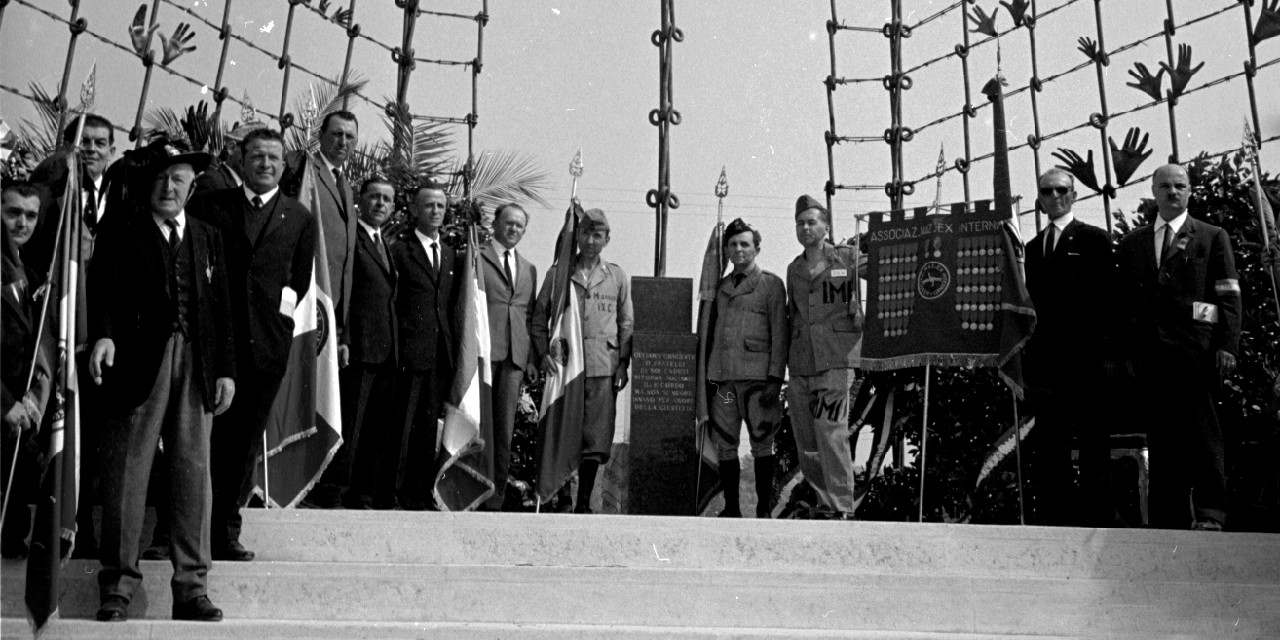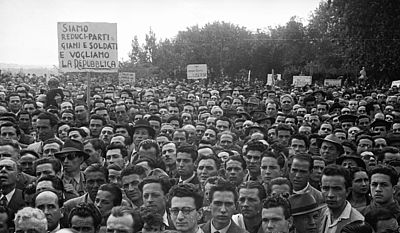
Commemoration instead of Compensation
The deported Italians returned to a politically completely changed country: fascism was a thing of the past, the monarchy was abolished in 1946. High unemployment made it difficult to start a new career. The former internees were accused of having worked voluntarily for the Germans. Many therefore remained silent about imprisonment in Germany.
The official culture of remembrance in Italy paid tribute to the military internees only late. Since the 1980s their refusal to collaborate has been recognised as "resistance without weapons". In Germany their fate is virtually unknown.
"We were not recognized by anyone! For serving a sentence as a prisoner! Because we prisoners of war have resisted, we have not accepted to collaborate with the Germans! That really is Resistenza!"
Albino Luciano Isabellon, 2006
Remembrance?
No (official) remembrance of military internees in Italy
Every year since 1946 the Italians celebrate the liberation from the fascist regime and from the German occupation by the "Resistenza" (Resistance) on April 25, 1945. The democratic governments of the Italian Republic emphasized the aspect of national self-liberation. From the 1960s it was recognized by all democratic forces as the "founding myth" of the state. For a long time the military internees had no place in it: they reminded of Italy's inglorious fascist past, which one would rather forget. Only with the acceptance of the captivity of the military internees as a form of "resistance" did their history find its way into the social and national culture of remembrance.
Compensation?
To this day, the German state has not compensated the majority of military internees. Prisoners of war were excluded from the compensation payments for forced labor from 2001. The Italians, too, were now considered prisoners of war; the Federal Republic did not recognize their forced labor.
Chronicle of the denial of compensation
27 February 1953:
London Debt Agreement
Reparation and compensation claims of former foreign companies forced laborers and concentration camp prisoners to the Federal Republic of Germany will be transferred to a later peace treaty postponed.
June 1956:
Federal Act on Compensation for Victims of National Socialist Persecution
No payments to former foreign forced laborers and prisoners of war.
2 June 1961:
German-Italian Global Agreement
The Federal Republic of Germany pays 40 million German marks (about 20 million euros) as a compensation for victims of persecution under the NS regime. Former military internees received nothing.
2 August 2000:
Law establishing the Foundation "Remembrance, Responsibility and Future" (EVZ)
The Federal Republic and the German economy provide 10 billion Deutsche Mark (around 5 billion euros) to compensate former forced labourers and deportees.
November 27, 2001:
"Informing" the Federal Government of the exclusion of military internees.
of compensation payments by the EVZ
The federal government is following an expert opinion that the military internees - despite the transfer to civilian status in 1944 - considered a prisoner of war. These are from compensation payments of the EVZ are excluded. Of approximately 130 000 Italian applications, the largest part is rejected.
11 March 2004:
Ruling of the Supreme Court of Italy
The Federal Republic of Germany is ordered to pay compensation to Italian forced labourers. The verdict has no consequences for the compensation of ex-internees.
2012:
Ruling of the European Court of Justice in The Hague
The court closes civil law actions of foreign and thus Italian citizens against the Federal Republic of Germany.

